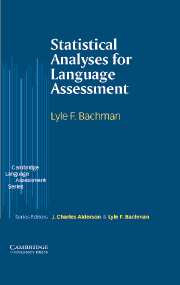Book contents
- Frontmatter
- Contents
- Series Editor's Preface
- Acknowledgements
- Abbreviations
- Part I Basic concepts and statistics
- 1 Basic concepts and terms
- 2 Describing test scores
- 3 Investigating relationships among different sets of test scores
- Part II Statistics for test analysis and improvement
- Part III Statistics for test use
- Bibliography
- Appendix: Statistical tables
- Index
1 - Basic concepts and terms
Published online by Cambridge University Press: 05 May 2010
- Frontmatter
- Contents
- Series Editor's Preface
- Acknowledgements
- Abbreviations
- Part I Basic concepts and statistics
- 1 Basic concepts and terms
- 2 Describing test scores
- 3 Investigating relationships among different sets of test scores
- Part II Statistics for test analysis and improvement
- Part III Statistics for test use
- Bibliography
- Appendix: Statistical tables
- Index
Summary
Language tests have become a pervasive part of our education system and society. Scores from language tests are used to make inferences about individuals’ language ability and to inform decisions we make about those individuals. For example, we use language tests to help us identify second or foreign language learners in schools, to select students for admission to universities, to place students into language programs, to screen potential immigrants and to select employees. Language tests thus have the potential for helping us collect useful information that will benefit a wide variety of individuals. However, to realize this potential, we need to be able to demonstrate that scores we obtain from language tests are reliable, and that the ways in which we interpret and use language test scores are valid. If the language tests we use do not provide reliable information, and if the uses we make of these test scores cannot be supported with credible evidence, then we risk making incorrect and unfair decisions that will be potentially harmful to the very individuals we hope to benefit. Thus, if we want to assure that we use language tests appropriately, we need to provide evidence that supports this use. An important kind of evidence that we collect to support test use is that which we derive from quantitative data – scores from test tasks and tests as a whole – and the appropriate statistical analyses of these data. An understanding of the nature of quantitative data and how to analyze these statistically is thus an essential part of language testing.
- Type
- Chapter
- Information
- Statistical Analyses for Language Assessment Book , pp. 3 - 40Publisher: Cambridge University PressPrint publication year: 2004



